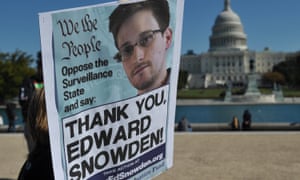E-media story 47: We cannot trust our government, so we must trust the technology

Apple’s battle with the FBI is not about privacy v security, but a conflict created by the US failure to legitimately oversee its security service post Snowden
This article discusses how we should back Apple's fight against the FBI for the encryption of Apple devices. The initial debate was to find out the contents of two terrorist's iPhones, but has evolved into a war on privacy and abolition of people's rights by the FBI.
The FBI is demanding Apple to create software that will enable them access into the terrorist's phone, but Apple stated that doing so would open a door to all iPhone devices, which raises the issue of security versus freedom.
"The fundamental problem is the breakdown of trust in institutions and organizations. In particular, the loss of confidence in oversight of the American national security establishment."
The article states that this is the wrong way to view it, and that rather it being security versus freedom, it's more about the lack of trust in the institutions set up to protect and serve. Apple had designed a security system that even they themselves could not get into, in order to preserve the privacy, but also due to the lack of trust in institutions that oversee surveillance. The approach, in the words of Yochai Benkler "builds security in a fundamentally untrustworthy world".
- Apple’s technology is a response to users’ thirst for technology that can secure their privacy and autonomy in a world where they cannot trust any institutions, whether government or market.
- we need to end the culture of impunity that protects people who run illegal programs and continue to thrive in their careers after they are exposed, but vindictively pursues the whistle blowers who expose that illegality.
- Apple’s case is not about freedom versus security; it is about trustworthy institutions or trust-independent technology. We cannot solve it by steam-rolling the technology in service of untrusted institutions.
I completely agree with Benkler here in that this is greater than the security of Apple, and more about the distrust between the people, and the agencies/institutions/governments meant to serve them. The FBI keep secrets and press down on resistance like Snowden, who is currently trapped in Russia with the Americans watching daily to arrest him if he leaves, which shows the fear tactics that they induce. A world where truth sayers and whistle-blowers are targeted instead of people doing illegal things is a world where agencies like the FBI deserve to be untrustworthy. It's the same with the phone hacking scandals and security issues here with the MI5. The world is not a democracy when there are elites and secrets being kept from the people being served. I believe this is due to people not wanting to be self governed and being grown up to depend on the elites who are the reason for the issues in trust today. The Bildeberg group has confidential meetings every year about the future of the world we all live in, yet do not let even a whisper get out to the people it concerns. The world is too uncertain to be sure who to trust, so Apple's thinking that the only ones we can trust is technology is a sound one, due to technology not being secretive or tyrannical in it's reign.
No comments:
Post a Comment